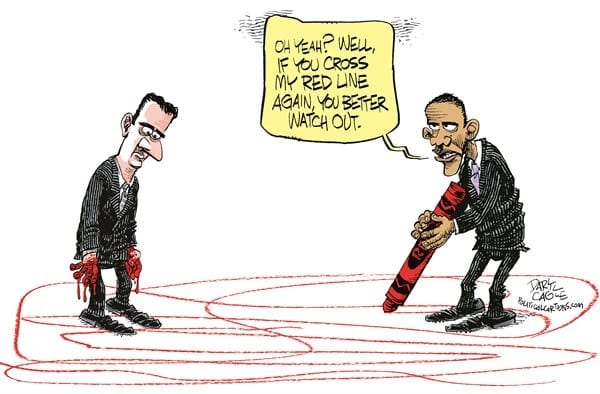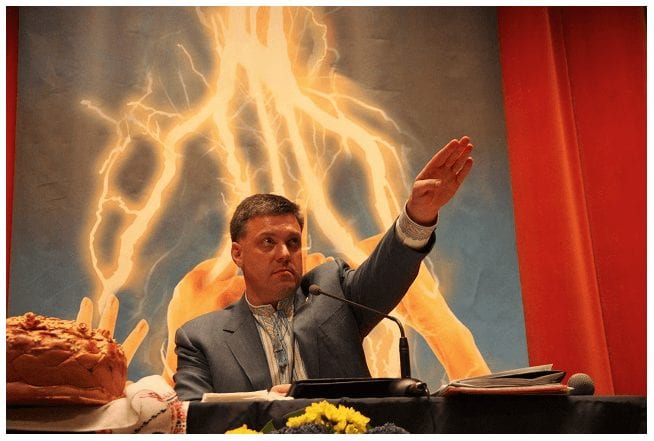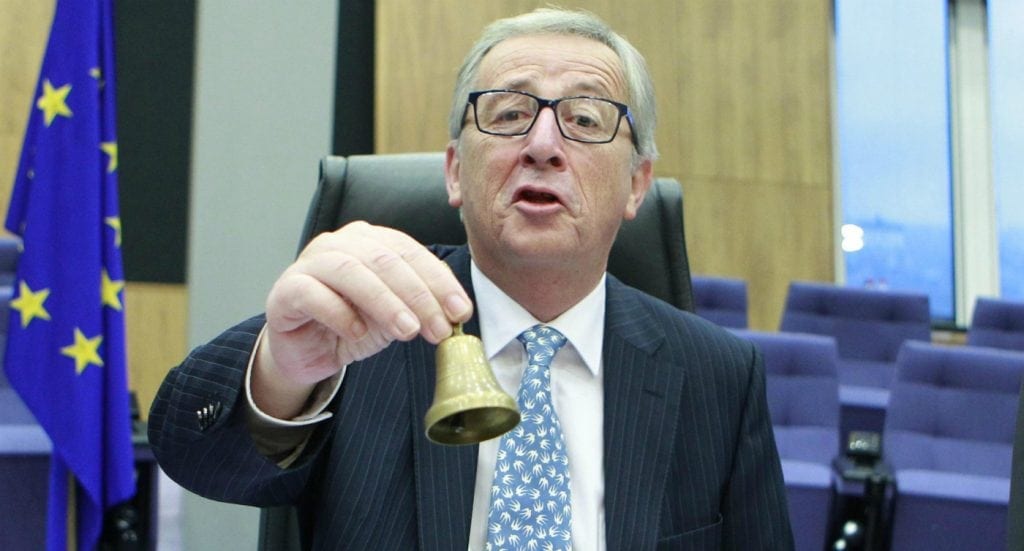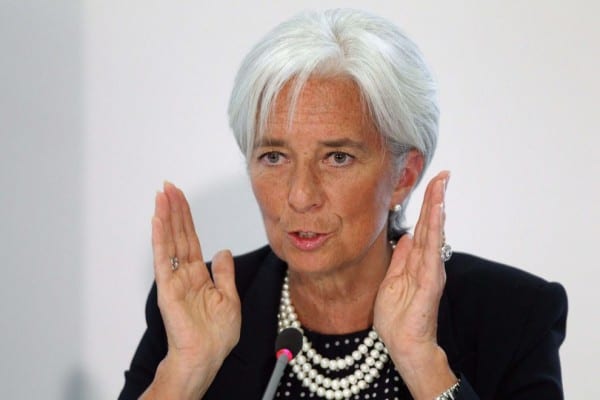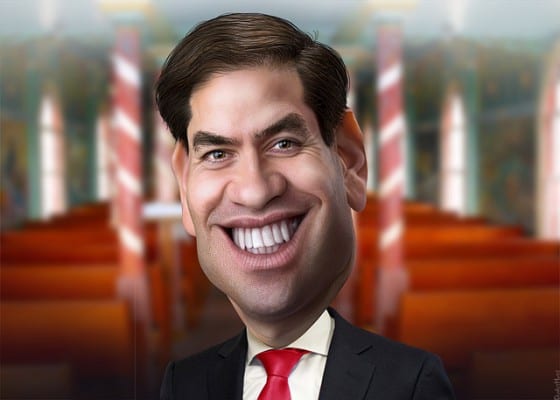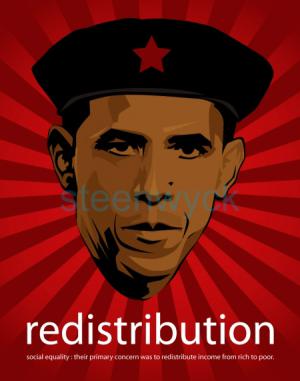The Spectacle of American Violence and the Cure for Donald Trump
Capitalism uber alles: Eighty families in the world control as much as half the world’s population.
Here to tell us about the violence unleashed on society by neoliberalism: one of our very favorite guests, educator and public intellectual Henry Giroux. Henry is co-author of the new book Disposable Futures: The Seduction of Violence in the Age of Spectacle.
Henry, let’s start with this: you write, “Under the interlocking regimes of neoliberal power, violence appears so arbitrary and thoughtless that it lacks the need for any justification, let alone claims to justice and accountability. It is truly as limitless as it appears banal.”
What’s an example of neoliberalism’s unjustified, unaccountable, arbitrary, thoughtless yet limitless violence that appears banal?
Henry Giroux: Hi Chuck, good to hear your voice.
I think we can see it in a whole range of realms. We certainly see it in the media, where extreme violence is now so pervasive that people barely blink when they see it, and certainly raise very few questions about what it means pedagogically and politically. Violence is the DNA, the nervous system of this system’s body politic.
We see it in the way a certain kind of lawlessness has crept over the society. We see it in a president who has a kill list—unconstitutional and semi-fascistic in its effects—and the media barely blinks about it. We see it in a police force all around the country that is not just militarized but appears to operate on a logic in which they can basically hunt minorities whenever they want—kill them, arrest them, put them in prison—and be completely immune from any consequences.
This violence is so pervasive. We see it in our schools, where we have more security guards now than teachers. We see it in California where more prisons are being built than colleges. It goes on and on. We see it in a trillion-dollar war budget, politics becoming an extension of war rather than vice versa.
This violence is like a fog. It covers everything. As a result it becomes so normalized that people barely blink when they see it, unless it becomes so shocking that it becomes literally impossible to ignore—the choking of Eric Garner, played over and over again; the killing of Tamir Rice; the Sandra Bland case.
CM: You mentioned President Obama’s unconstitutional kill list, and the lack of media attention on it’s being unconstitutional. One of the theories within the media is that chasing ratings, in a sense, reflects democracy, because they’re giving the public what it wants.
Is this what we want? Does the United States want a media that doesn’t point out that President Obama has an unconstitutional kill list? Does this reflect the way we want the world presented to us?
HG: That’s such an insane myth. I don’t think the media is a reflection of anything. The media is an active political and pedagogical force that shapes reality. If the media were a reflection of anything, then we’d have to raise the question of why it’s in the hands of basically six corporations.
The media is about power. It’s not about responding to the wishes of people. All you have to do in the United States is turn on the national news at six-thirty, and watch big pharma intervene between the news stories, trying to tell people what drugs they should buy. That’s not a reflection of anything. That’s an attempt to promote a particular kind of consumer logic that basically abuses people.
It’s much better to talk about the media as a system of propaganda and abuse, of manufactured consent, than it is to claim it’s some kind of democratizing force that is not responsible for what it does. The notion that the media simply reflects reality is an argument that justifies its flight from responsibility.
But the media is very smart. The media understands that it’s not about entertainment alone. It’s a pedagogical force. They need to make something meaningful in some way to establish points of identification. And the great educators, in the worst sense, are the advertisers. This goes right back to  the 1920s and 30s, when they realized that the educational force of culture has enormous potential for shaping consciousness, for mobilizing desires, for producing particular kinds of agents. What we see in television is that they have the ability to tap into the deepest needs and desires that people feel, and to mobilize those desires.
the 1920s and 30s, when they realized that the educational force of culture has enormous potential for shaping consciousness, for mobilizing desires, for producing particular kinds of agents. What we see in television is that they have the ability to tap into the deepest needs and desires that people feel, and to mobilize those desires.
At the same time I’m not arguing that there’s a direct relationship between what the media says and how people act. This stuff gets mediated. But it gets mediated within a very narrow framing mechanism that’s almost entirely about consumption. It’s almost entirely about defining the subject, defining the citizen, as one of three things: a consumer, a threat (in this new age of surveillance), or as utterly disposable. Excess.
CM: You write: “Violence, with its ever-present economy of uncertainty, fear, and terror, is no longer merely a side effect of police brutality, war, or criminal behavior. It has become fundamental to neoliberalism as a particularly savage facet of capitalism. And in doing so it has turned out to be central to legitimating those social relations in which the political and pedagogical are redefined in order to undercut possibilities for authentic democracy.”
You describe neoliberalism as a facet of capitalism. Isn’t neoliberalism just capitalism? What’s the difference between neoliberalism and capitalism?
HG: It’s an important question. I think that when we look at liberalism in the past, liberal capitalism, one of the things that defined it was that there had to be political concessions on the part of the rich towards workers and others, because they really believed if those concessions didn’t work, there was the chance of revolt. There might be resistance. There was the shadow of Communism, with its emphasis on equality—economic, political and social equality. All those ideals were a threat to liberalism.
Neoliberalism represents a very different animal in a number of ways. First of all, under neoliberalism we no longer have a traditional state. We have an economic state. Economics now drives politics. This gives us a system in which the relationship between power and politics is no longer fused. Power is global. We have an elite that now floats in global flows. It could care less about the nation-state, and it could care less about traditional forms of politics. Hence, it makes no political concessions whatsoever. It attacks unions, it attacks public schools, it attacks public goods. It doesn’t believe in the social contract.
This has a number of byproducts. We have massive forms of inequality developing because there are no longer any concessions. There’s a war being waged on democracy and all social spheres and institutions that tend to defend it.
Secondly, under neoliberalism society has become increasingly militarized, meaning that as all aspects of the social state are eliminated, a police state is rising in its place. All problems that in the past were seen as social problems, and hence required social solutions, now acquire police solutions.
Our behavior is increasingly criminalized. If you’re poor, that’s a crime. If you’re homeless, that’s a crime. If you’re a young person who’s in trouble, that’s a crime. If you violate a minor law, there’s a chance that you could be killed. If you look a police officer in the eye, as Freddie Gray did, there’s a chance that you could be put in the back of a van and tortured.
Casino capitalism destroys those institutions that generate the capacity for critique, dissent, thoughtfulness and collective struggles. In its place, it has erected a series of cultural apparatuses that revel in idiocy, celebrity culture, conformity and infantilization. Fox News is the new party organ, only dumber. Ninety-five percent of talk radio is controlled by right-wing ideologues spewing out an endless tirade of racist, sexist, hate-filled discourse, parading as innocent escapism. Hollywood almost exclusively embraces big-budget films whose worth is defined largely through the aesthetics of hyper-violence and the number of people slaughtered graphically, often in slow motion. The mainstream media does not produce violence directly: it simply legitimates it as a form of public pedagogy, parading as innocent entertainment. This is the pedagogy of infantilism — an unacceptable obscenity of the stupid and arrogant trading in violence, spectacles, common sense, and, ultimately, repression. —H. Giroux (Radical democracy against cultures of violence).
It seems to me that as economics drives politics and money markets set policies, what we have is an enormously powerful emergence of both a police state on the one hand and an incredible culture of cruelty on the other. All of the sudden, shared hopes are replaced by shared fears.
Any form of dependence whatsoever that is inconsistent with radical individualism is now viewed as a weakness. It’s viewed as dishonorable. Care for the other is now seen as a scourge. This helps explain, as you well know, endless commentaries by right-wingers about how people on welfare are moochers. People who can’t imitate the one percent are somehow lazy. Workers who don’t have jobs in an economy where there are no jobs are people we shouldn’t trust, because they don’t really care about work. And on it goes.
CM: You write, “Under the regime of neoliberalism, individual responsibility becomes the only politics that matters, and serves to blame those who are susceptible to larger systemic forces. Even though such problems are not of their own making, neoliberalism’s discourse insists that the fate of the vulnerable is a product of personal issues ranging from weak character to bad choices or simply moral deficiencies. This makes it easier for its advocates to argue that poverty is a deserved condition.”
But Henry, that is only if poverty even exists in the eyes of the wealthy. There’s a new study out this week called Why Wealthier People Think People Are Wealthier, and Why It Matters at the journal of the Association of Psychological Science. It states, “The present studies provide evidence that social sampling processes lead wealthier people to oppose redistribution policies. In samples of American internet users, wealthier participants reported higher levels of wealth in their social circles. This was associated in turn with estimates of higher mean wealth in the wider US population, greater perceived fairness of the economic status quo, and opposition to redistribution policies.
So does neoliberalism dispose of the poor by believing that they simply do not exist?
HG: Increasingly, we are seeing a market that is so segregated that it becomes impossible for rich people to even see the other. These people live in gated communities. I don’t simply mean a gated community like you would see in Florida. I mean they live in places so removed from everybody else, they operate in circles so incestuous and so closed, they’re off on islands. To try to understand their indifference is to understand also their separation from the rest of society.
They have the wealth such that they don’t have to immerse themselves in any places where they’re going to confront poverty, or “criminal” behavior, or the lawlessness of the police, or where they would have to worry about being under surveillance because they hold views at odds with what the American government and major corporations believe.
We have never seen the isolation of the rich to the degree that we see it now. They’re global. They travel all over the world. They’re not in any way—it seems to me—committed to any one place. So it’s easy for them to say, “We don’t see this. We don’t see poverty. We don’t think it’s that bad. We think wealth is really being distributed in ways that are fair.”
Trump, like that canary in the coalmine, makes clear what elements of fascism are really like…The racism, the ignorance, the stupidity, the baiting, the great-man affect, this notion that he exists in a circle of certainty that can’t be doubted, this kind of perverse hatred of the other…![]()
All you have to do is look. Look at the money these hedge fund managers make. When you look at the Koch brothers, who make three million dollars an hour on their dividends alone, you begin to get a sense of what we’re talking about. The estimates now are that the upper 1% control something like 40% of all wealth. Eighty families in the world control as much as half the world’s population. These figures are being produced every day.
We need to put a human face to these figures. We need to make clear that something is being taken from the vast majority of people, and is causing an enormous amount of suffering. Half the population of young schoolchildren in the United States now lives below the poverty line. You can’t use the argument that people are simply not picking themselves up by their bootstraps when you’re talking about children.
To go back to something I said earlier, it’s really about the swindle of fulfillment. It says anybody can make it, because we’re all on a level playing field. But we’re not on a level playing field. That ‘s precisely the point, and that’s what the rich don’t want to look at. They don’t want to recognize that they’re not producing wealth at all. They’re hoarding wealth. That’s different.
In hoarding it, they’re assuming power and exercising it in ways that make it very, very clear—as that recent Princeton study said—that they hate democracy. They hate democracy. Democracy is an evil to these people.
CM: In a recent article at Truthout on Donald Trump, you write, “Trump provides a more direct and arrogant persona that produces the ugliness of a society ruled entirely by finance capital and savage market values, one that prides itself on the denigration of others as well as of justice, passion, and equality.
“Trump is the hyperventilating yellow canary in the coal mine reminding us all that social death is a looming threat. He is emblematic of a kind of hyper-masculinity that rules dead societies. He is the zombie with the blond wig holding a flamethrower behind his back. He is the perfect representation of the society of spectacle, with the perverse grin and the endless discourse of shock and humiliation.
“Trump’s hysterical rants are, as Frank Rich once argued, ‘another symptom of a political virus that can’t be quarantined and whose cure is as yet unknown.’”
Henry, what is the cure for Donald Trump?
CM: You write, “Trump is the unfiltered symbol of the new authoritarianism, emblematic of a kind of boots-on-your-face politics nurtured by an economic and cultural system that combines the endless search for capital with the unceasing production of violence. Trump is the living embodiment of the main character in the film American Psycho, a symbol of corporate domination on steroids, an out-of- control authoritarian parading and performing unknowingly as a clown, and as a symbol of unchecked narcissism and a bearer of a suffocating culture of fear. He is the symbol of a failed sociality and a declining social order.”
So in other words, he embodies everything that’s wrong with the US. And the US loves him. Why, Henry?
HG: They love him because of the degree to which they have been so depoliticized, so removed from the public sphere, so taught to believe that the only thing that matters any longer is excessive shock and the spectacle of humiliation and violence, that he actually becomes attractive. In a culture as depoliticized as this, where entertainment becomes the only modality that matters, all of the sudden Trump garners a lot of respect. He garners attention.
But I also think there’s something else. We have to recognize that there’s an element in the population that he speaks to, around questions of racism, militarism, violence, nationalism, and around the notion the state should be inhabited largely by white Christians. He’s mobilizing the fascist base that has been associated with elements of the Republican party for the longest time. He’s making visible what many people wanted to deny even exists.

Sean Patrick Hannity, the bullying Irishman on Fox’s payroll, is one of the nation’s rabid attack dogs for the fascist right, and a splendid exponent of excremental radio.
They often say that he “speaks the truth,” right? But I think what really is happening is he’s become a symbol of the kind of cynicism the American public feels towards politicians. He embodies, and he’s mobilizing, that cynicism. Because people have no faith in politics anymore. People actually believe that politics is dead, because it’s bought and sold.
But at the same time they don’t have an alternative narrative by which they could embrace that same understanding to mobilize social movements, to mobilize political formations that would take the question of democracy seriously rather than believing that the only route to politics is through Hitler-like fascist politicians who mobilize the crudest, most racist and most base sentiments of what it means to feel something.
 I really believe it’s crucial to talk about this guy as really symptomatic of the rise of a very dangerous kind of authoritarianism. Hannah Arendt said that at the base of fascism, at the base of totalitarianism, is a kind of engineered thoughtlessness. The inability to think, to allow things to become normal that should be viewed with horror. Trump erases the ability to recognize suffering and to try to understand the conditions that produce it, the ability to become a moral witness in the face of injustices. Trump erases that. Trump appeals to a population in which that becomes irrelevant. And that is so dangerous, at this particular time.
I really believe it’s crucial to talk about this guy as really symptomatic of the rise of a very dangerous kind of authoritarianism. Hannah Arendt said that at the base of fascism, at the base of totalitarianism, is a kind of engineered thoughtlessness. The inability to think, to allow things to become normal that should be viewed with horror. Trump erases the ability to recognize suffering and to try to understand the conditions that produce it, the ability to become a moral witness in the face of injustices. Trump erases that. Trump appeals to a population in which that becomes irrelevant. And that is so dangerous, at this particular time.
Look at the Republican candidates all around him now, all falling into line. Doing things like stomping on their telephones, or taking out saws and trying to cut through the tax code. They all of the sudden take on the notion of the spectacle as a reasonable way to address a population that is seduced by it.
CM: You mentioned mobilizing social movements. There are all these protests against police violence. There are protests for the Fight for Fifteen. But are all of these protests missing the target in that they should be protests against neoliberalism?
HG: I think they should be protests with a comprehensive understanding of the various elements that make up the new authoritarianism. They should build capacity to both protest specific elements of this kind of horror, this kind of terror and violence, and also be able to bring these together into a more comprehensive view of politics.
And I think that might happen. The situation in the United States, Chuck, has become so extreme. I don’t know if you’ve seen this figure: two outlets, the Washington Post and the Guardian, are now tracking police violence in the United States, and from January to July of this year the police have killed three people a day. Three people a day.
You couple that with the attack on various social programs that we see happening. It’s going to produce two kinds of resentment. It’s going to produce the kind of resentment that we see as cynical about politicians, that moves towards Trump, or it’s going to produce a radical revolutionary movement that is going to have to redefine what democracy means outside of the boundaries of capitalism.
Capitalism, in my estimation, is not about democracy. I think we’re beginning to see an understanding of this. We see it in the Black Lives Matter movement. We see it among black youth who are now struggling and trying to make connections internationally with other groups and trying to figure out what’s going on in the world and the ways things like police violence and systemic violence all come together under neoliberalism.
The world can no longer exist globally under a neoliberal ethic in which entire countries like Greece can be subordinated to capital in a way in which the entire population suffers. The entire population. Fifty percent of all youth in Greece have no jobs, they’re unemployed. We’re talking about closing down the future for generations of young people all over the world today.
I think we need a different model, and I think people are searching for that model. I would like to think that this is about a patient impatience. A willingness to say, okay, we don’t have that movement in the way we’d like to see it now, but we see elements of these movements emerging, using a language we’ve never seen before, and for that I’m hopeful.
CM: Henry, thank you for coming on This is Hell! again.
HG: It’s my favorite program. Thank you, Chuck, for having me.
ABOUT THE AUTHOR
This is a transcript from the August 1, 2015 episode of This is Hell! Radio podcast (Chicago). Henry A. Giroux currently holds the McMaster University Chair for Scholarship in the Public Interest in the English and Cultural Studies Department and a Distinguished Visiting Professorship at Ryerson University. His most recent books are America’s Education Deficit and the War on Youth (Monthly Review Press, 2013) and Neoliberalism’s War on Higher Education (Haymarket Press, 2014). His web site is www.henryagiroux.com. Chuck Mertz is the host of This is Hell! Radio in Chicago.
“…in the new exuberant aggressiveness of world capitalism we see what communists and their allies held at bay.” – Richard Levins (Source: The Proletarian Center)
FACT TO REMEMBER:
IF THE WESTERN MEDIA HAD ITS PRIORITIES IN ORDER AND ACTUALLY INFORMED, EDUCATED AND UPLIFTED THE MASSES INSTEAD OF SHILLING FOR A GLOBAL EMPIRE OF ENDLESS WARS, OUTRAGEOUS ECONOMIC INEQUALITY, AND DEEPENING DEVASTATION OF NATURE AND THE ANIMAL WORLD, HORRORS LIKE THESE WOULD HAVE BEEN ELIMINATED MANY YEARS, PERHAPS DECADES AGO. EVERY SINGLE DAY SOCIAL BACKWARDNESS COLLECTS ITS OWN INNUMERABLE VICTIMS.
[printfriendly]
And remember: All captions and pullquotes are furnished by the editors, NOT the author(s).
What is $5 a month to support one of the greatest publications on the Left?










